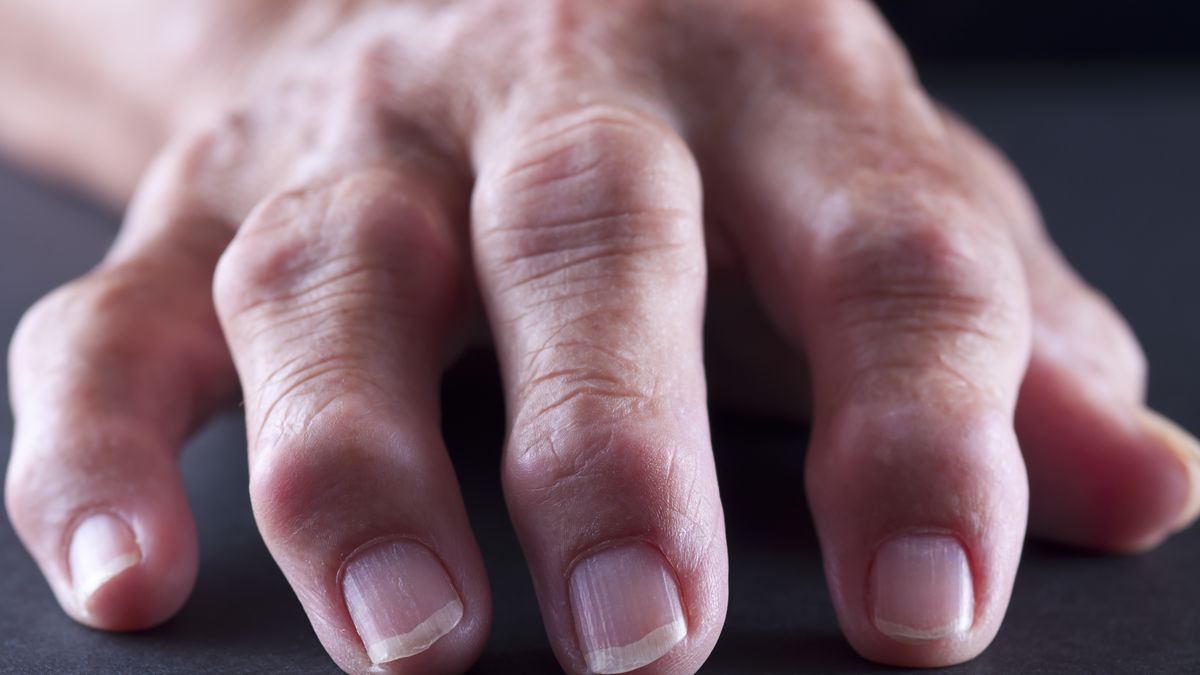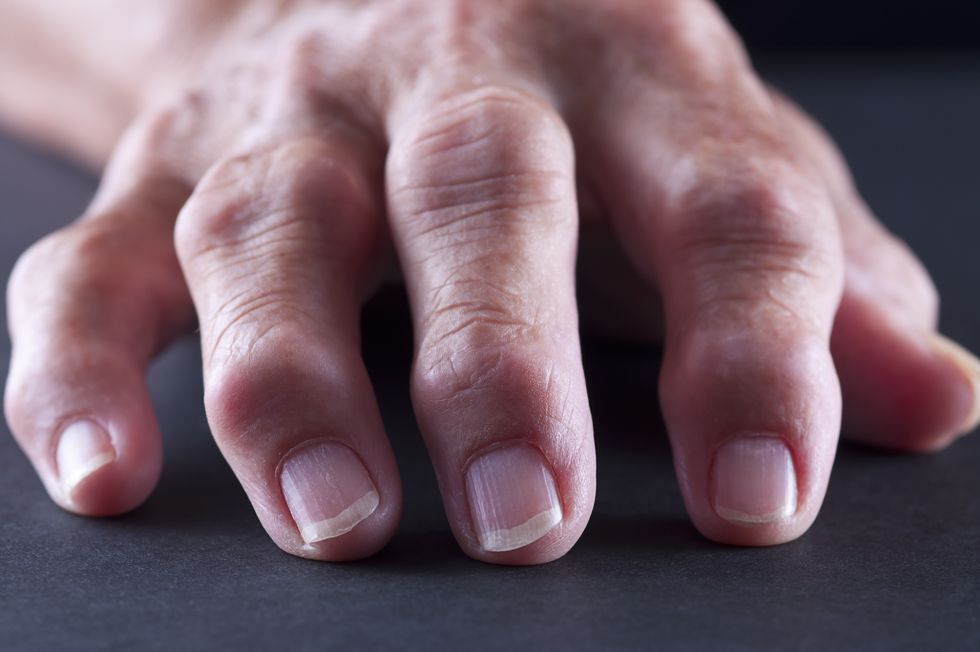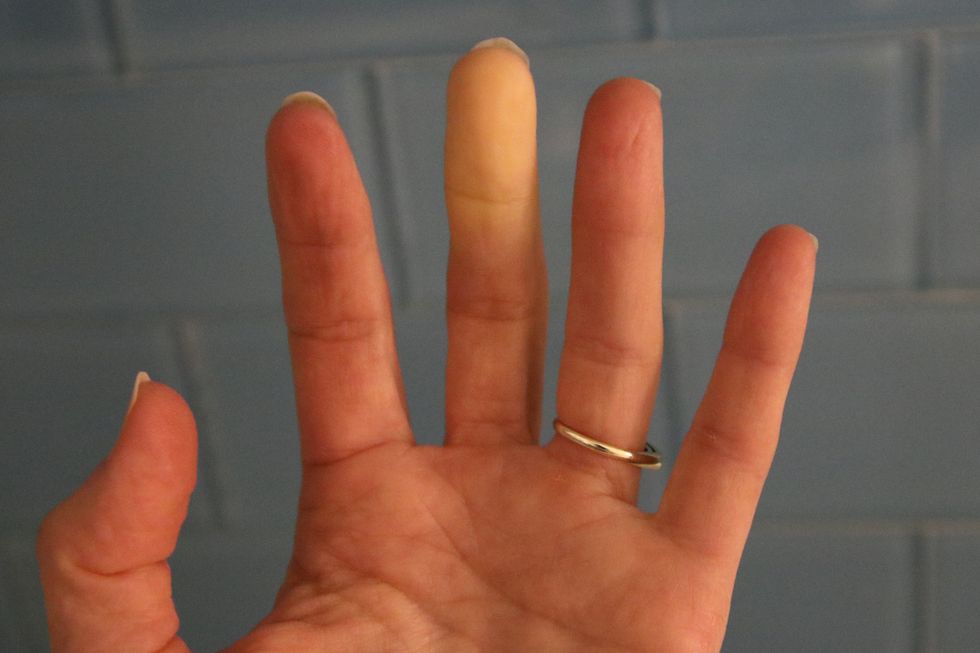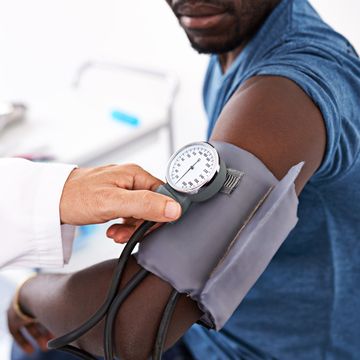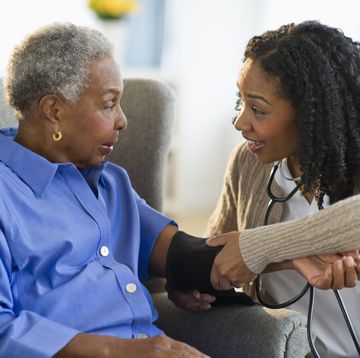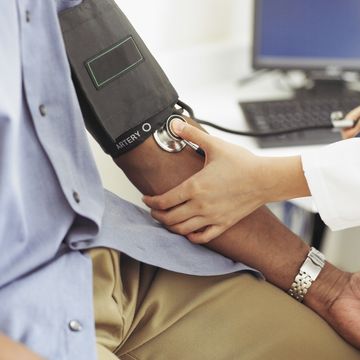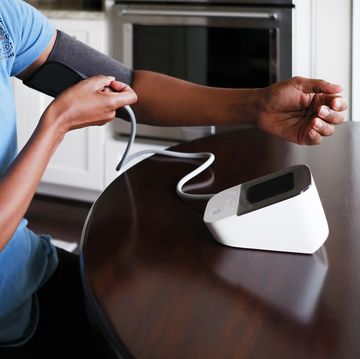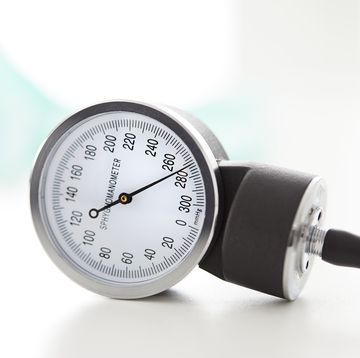You have arthritis pain, and the inflammation in your joints causes your fingers to swell up and resemble little sausages. Or maybe you’ve enjoyed some salty foods, and now your wedding ring is stuck on your finger.
Should you freak out? Probably not. Fingers swell for a lot of reasons, and many of them are harmless. But sometimes the puffiness, medically known as dactylitis, points to more serious health conditions. Here are some of the common causes of swollen fingers, and when you should call your doctor.
1. It’s really hot outside
Heat causes blood vessels to expand, which allows more heat to escape through your skin so you can keep cool, explains Tammy Olsen Utset, M.D., M.P.H., an associate professor in the rheumatology department at the University of Chicago. As the vessels stretch, some of their fluid can leak into your soft tissues and cause puffiness.
Dr. Utset says this type of swelling tends to go away as you use your hands and continue your regular activity. But if you notice swelling only in your hands and fingers (and not your legs), accompanied by pain or a weak grip, that could be a sign it’s not just the heat and you need to consult your doctor.
2. You’ve eaten a lot of salty foods
General Tso’s chicken, lots of chips, or anything fried could be the cause behind your swollen fingers. Your body likes to keep a consistent salt-to-water balance, so when you consume extra sodium, it compensates by retaining more water, leading to swelling, Dr. Utset says.
Typically, mild swelling brought on by salty foods goes away on its own within a day but it can last longer depending on how much extra salt is in your system. If you limit your salt intake and the swelling persists, see your doctor, Dr. Utset advises.
3. You might have osteoarthritis or rheumatoid arthritis
If it’s the bony finger joints themselves that are enlarged (say, you can’t get rings over your knuckles), osteoarthritis may be to blame, especially if your swollen fingers appear in the morning. This age-related form of arthritis is caused by the wearing down of the cushioning tissues at the end of your joints. Osteoarthritis is often, but not always, accompanied by pain and stiffness, Dr. Utset says.
Rheumatoid arthritis (RA), an autoimmune disease that attacks the lining of the joints, can also cause swelling. Unlike osteoarthritis, RA isn’t age-related and can happen to anyone at any age. Swelling in people with RA often happens in the wrists and finger joints. “RA can cause the joints to swell up as well as cause inflammation in between the joints,” says Neha Vyas, M.D., a physician in the department of family medicine at Cleveland Clinic.
4. An infection or injury could be to blame
Infections in your fingers, known as felons, cause your fingers (particularly around the tip, pad, or nail) to fill up with pus. Infections can form in different ways, but dishwashing without gloves, manicures, ingrown nails, hangnails, and biting your nails can all transfer bacteria to your fingers and lead to swelling, redness, and throbbing pain. Minor traumas and injuries, like cuts, puncture wounds, and splinters can also have similar effects.
When caught early, infections can be treated with warm water or saline soaks and antibiotic ointment, but if you’re in serious pain, have trouble using your finger, or notice any oozing pus, see your doctor ASAP, who can drain excess fluid and prescribe oral antibiotics if needed.
5. It could be a side effect of your tough workout
During exercise, your fingers and hands might swell because the blood vessels in your body are responding to the increased energy demands on your muscles. “When it comes to exercise, our body produces heat. The vascular system allows more fluid to release into our fingers, hands, and toes. This is the way the body cools down,” Dr. Vyas says.
6. It could be your medication
Certain medications can also cause swelling in the fingers and hands. Dr. Vyas says high blood pressure drugs, OTC pain meds, diabetes medications, steroids, and birth control pills can all cause puffiness as a general side effect.
7. You might be dealing with carpal tunnel syndrome
When the nerve that runs from the forearm to the palm of the hand is pinched or squeezed at the wrist, that’s when carpal tunnel syndrome develops, Dr. Utset explains, a condition that women are three times more likely to develop than men.
While there are typically various causes, repeated trauma or injury to the wrist, work stress, an under-active thyroid, and rheumatoid arthritis can all be triggers. Carpal tunnel syndrome can result in swollen fingers, and is usually accompanied by pain, burning, tingling, or numbness in the hands or arms—symptoms that often develop slowly over time. To help prevent and ease carpal tunnel syndrome, try these five stretches at your desk.
8. Pregnancy could be messing with your body
Some swelling is typical for expectant moms. But swelling in the hands and face—especially if pressing your thumb into your skin leaves a noticeable indentation—can be a red flag for preeclampsia, a complication characterized by high blood pressure.
If preeclampsia goes untreated, it can lead to organ damage, including the liver and kidneys. Dr. Vyas says that in addition to swelling, signs of preeclampsia include blurry vision, high protein in your urine, headaches, nausea, and vomiting. The risk of preeclampsia is highest in pregnant women older than 40 or those having their first child. It’s also common in women carrying twins or triplets, and those who are obese.
9. You might have Raynaud’s disease
Raynaud’s disease is a rare condition characterized by narrowing of your arteries, which limits blood circulation. The causes are not completely understood, but cold temperatures, stress, injuries to the hands, tissue damage, and even certain drugs (like high blood pressure or migraine meds) may all be triggers. The condition is more likely to occur in women than men, Dr. Utset says.
Swelling—along with numbness, prickling, pain, or color changes in the skin—occurs most commonly in the fingers and toes when circulation returns (as you warm up or your stress dissipates). When an “attack” comes on, your fingers may first turn ghostly white, but other parts of your body can also be impacted, such as your nose, lips, or ears.
10. You might have problems with your kidneys
If your kidneys fail to remove excess fluids—also known as edema—your body will retain it, which could result in swollen hands.
Edema can affect any part of your body, but swelling mostly occurs in your hands, feet, legs, and ankles. “When your kidneys aren’t filtering what needs to go out, the fluids stay within you,” Dr. Vyas explains. “The kidneys also help regulate the electrolytes in our body, so any type of kidney disease or kidney issue can affect this process. Hypertension and both type 1 and type 2 diabetes are some conditions that can cause these kidney problems,” she adds.
11. You might have a blockage in your lymphatic system
Lymphedema is a rare limb-swelling disease that comes on when lymph fluid (which carries waste, bacteria, and viruses out of the body) doesn’t adequately drain. Your fingers and toes may swell, and usually, your arms and legs will swell, too. Your skin may also feel tight or thicker than usual, according to a report from the National Cancer Institute. Lymphedema has been linked with surgery or radiation breast cancer treatments. In rare cases, lymphedema can also be caused by an abnormal growth near a lymph node or vessel, which can lead to fluid blockage.
12. You might have trigger finger
Trigger finger (or trigger thumb) is a condition that causes your fingers to get stuck in a bent position, according to the Cleveland Clinic. Those with the condition may have stiffness when bending the affected finger or hear snapping and popping when moving them. With trigger finger, the tendons become irritated and swollen and can no longer easily move. A bump may also form on the tendon, which can make it even more difficult for the tendon to easily move. “Trigger finger can lead to swelling because of the inflammation of the tendons and because when people have trigger finger, they try to prevent from bending their finger, to prevent the ‘catch’, and the immobilizing of the joint also causes swelling,” says David C. Hay, M.D., orthopedic hand and wrist surgeon at Cedars-Sinai Kerlan-Jobe Institute.
When to see a doctor about swollen fingers
Swollen fingers is a broad symptom and it could be a million things, says Dr. Hay. And typically, when you’re treating your swollen fingers, you can treat them with both anti-inflammatory medication and movement. However, if your fingers are not improving after a week of rest and anti-inflammatory meds, or come with associated pain, it’s time to see a specialist.
“If your swollen finger appeared after some kind of wound or bite, you’re really worried about infection and you have to take that very seriously,” says Dr. Hay. Alternatively, “a swollen finger from an injury can just be a sprain or a break, and if it’s not getting better in a few days, see a doctor.”
And lastly, if you have swollen fingers in the absence of injury or wound or bite, then it’s often due to arthritis, or trigger finger, or some other underlying condition, and if it’s not improving, you’re seeing a doctor,” says Dr. Hay.
Having swollen fingers is a very general symptom, but if it doesn’t resolve, your body is trying to tell you something and it’s worth seeing a doctor.
Sarah DiGiulio is a New York City-based writer and editor focusing on health, wellness, and medicine. She frequently reports on psychology, sleep, relationships, productivity, neuroscience, and oncology. Sarah has written for TODAY.com, NBC News, Proto Magazine, HuffPost, Prevention, Oncology Times, and several other publications.
Madeleine, Prevention’s assistant editor, has a history with health writing from her experience as an editorial assistant at WebMD, and from her personal research at university. She graduated from the University of Michigan with a degree in biopsychology, cognition, and neuroscience—and she helps strategize for success across Prevention’s social media platforms.
Rekha Kumar, M.D. is recognized as an international leader in the field of obesity medicine. She is a practicing endocrinologist in New York City and served as the former medical director of the American Board of Obesity Medicine. Dr. Kumar has lectured internationally on the topic of the medical assessment and treatment of obesity. She has published several papers and textbook chapters in her field and serves as an associate editor of the journal Obesity. She is frequently quoted in the media on topics ranging from the diabetes epidemic in the United States to discussing fad diets, exercise trends, and the complications of Covid-19 in patients with obesity. Dr. Kumar’s areas of expertise include the clinical assessment of patients’ obesity and metabolic syndrome, the effect of obesity on reproductive health and fertility, as well as thyroid disease, and metabolic bone disease.
